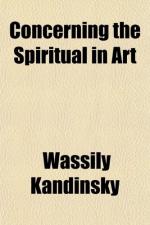Spiritual darkness, the insecurity of ignorance and fear pervade the world in which they move. Maeterlinck is perhaps one of the first prophets, one of the first artistic reformers and seers to herald the end of the decadence just described. The gloom of the spiritual atmosphere, the terrible, but all-guiding hand, the sense of utter fear, the feeling of having strayed from the path, the confusion among the guides, all these are clearly felt in his works.[Footnote: To the front tank of such seers of the decadence belongs also Alfred Kubin. With irresistible force both Kubin’s drawings and also his novel “Die Andere Seite” seem to engulf us in the terrible atmosphere of empty desolation.]
This atmosphere Maeterlinck creates principally by purely artistic means. His material machinery (gloomy mountains, moonlight, marshes, wind, the cries of owls, etc.) plays really a symbolic role and helps to give the inner note. [Footnote: When one of Maeterlinck’s plays was produced in St. Petersburg under his own guidance, he himself at one of the rehearsals had a tower represented by a plain piece of hanging linen. It was of no importance to him to have elaborate scenery prepared. He did as children, the greatest imaginers of all time, always do in their games; for they use a stick for a horse or create entire regiments of cavalry out of chalks. And in the same way a chalk with a notch in it is changed from a knight into a horse. On similar lines the imagination of the spectator plays in the modern theatre, and especially in that of Russia, an important part. And this is a notable element in the transition from the material to the spiritual in the theatre of the future.] Maeterlinck’s principal technical weapon is his use of words. The word may express an inner harmony. This inner harmony springs partly, perhaps principally, from the object which it names. But if the object is not itself seen, but only its name heard, the mind of the hearer receives an abstract impression only, that is to say as of the object dematerialized, and a corresponding vibration is immediately set up in the heart.
The apt use of a word (in its poetical meaning), repetition of this word, twice, three times or even more frequently, according to the need of the poem, will not only tend to intensify the inner harmony but also bring to light unsuspected spiritual properties of the word itself. Further than that, frequent repetition of a word (again a favourite game of children, which is forgotten in after life) deprives the word of its original external meaning. Similarly, in drawing, the abstract message of the object drawn tends to be forgotten and its meaning lost. Sometimes perhaps we unconsciously hear this real harmony sounding together with the material or later on with the non-material sense of the object. But in the latter case the true harmony exercises a direct impression on the soul. The soul undergoes an emotion which has no relation




